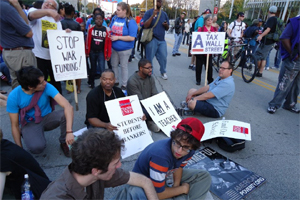Thousands are marching Chicago’s streets this week to protest overwhelming corporate power and demand government action to create jobs and reconstruct the nation’s fraying social safety net.
Monday’s march began as five separate marches which converged to form a demonstration of several thousand in front of the Art Institute of Chicago, where a financial trade group was holding its opening-night reception.
The feeder marches were made up of groups raising their own issues—unions, community organizations, housing activists, immigrants rights groups, environmentalists, teachers, and students.
But they all coalesced around the slogan “Take Back Chicago” and quickly adopted the theme of the ongoing Occupy Chicago movement, “We are the 99%.”
“We want people to realize it is just 1 percent that is actually controlling everything,” said David Olivoso, an activist with Occupy Chicago.
The protests were launched by “Stand Up Chicago,” a community-labor coalition. They released a blueprint calling for a 25-cents-per-contract tax on the city’s financial exchanges, which would generate $1.4 billion in revenue annually and could create 40,000 jobs.
As the marchers met in downtown Chicago, dozens of activists dressed as Robin Hood kayaked the Chicago River to join them in demands that big banks pay for the mess they created.
Protests continued Tuesday, with groups converging on the mortgage bankers association to demand banks pay their fair share of taxes, invest in jobs, and write down loans for homeowners who owe more than their house is worth.
Members of a Chicago community group, Action Now, cleaned up garbage from a vacant home owned by Bank of America Tuesday. They say bank-owned houses are falling into ruin and becoming magnets for crime, and they’ll risk arrest as they try to deliver the trash to the bank this afternoon.
Another community group is demonstrating outside a realty association Tuesday, decrying the aggressive—and often illegal—tactics used to oust tenants from foreclosed apartment buildings.
The actions are the product of anger building over three years of relentless recession, mounting foreclosures, cutbacks in public services, and attacks on workers. It is the same anger manifested in the massive demonstrations in Madison, Wisconsin, last spring, and the growing “occupy” phenomenon that has spread to dozens of cities. Many in the crowd Monday said they took their cues from the Arab Spring as well.
LONG AWAITED
For many, this week’s actions are long-awaited. Some wondered why it has taken so long for the working class to mobilize and demonstrate its anger.
Tom Shepherd, a member of SOAR, the Steelworkers retiree association, saw the giant protests as a possible turning point.
“We’ve had way too much complacency,” Shepherd said. “People are finally realizing what 10 years of war have cost us, how we could have fixed so much of the infrastructure in this country, how we could have put people back to work. It’s finally catching on, and it’s about time.”
The sight of the five marches converging into one set off cheers as protesters saw their numbers and celebrated their unity.
Several blocks in each direction were taken over by the marchers despite a heavy police presence.
At one point, a line of horse-mounted police created a barrier, attempting to prevent the contingent approaching from the west from joining the others. The decision was strange, since the street was already firmly in control of the other feeder marches.
After 10 tense minutes, the police seemed to recognize the futility of their efforts and backed off, allowing the entire march to finish its procession to the Art Institute.
Once there, the crowd sat down in the street and raised their fists in the air at the bankers and financiers comfortably dining inside the museum while their reckless gambling continues to wreak havoc outside. Police arrested 24 for blocking the roadway, according to media reports.
CATCHING ON
But anger wasn’t the only emotion in evidence on Chicago’s streets Monday. There was also a cautious hope from the older crowd, and a more jubilant hope from many of the youth; a hope that working people have finally had enough and that something ready to challenge concentrated corporate power may emerge from the spontaneous and diffuse demonstrations that have spread across the nation in recent weeks.
Larry Spivak with AFSCME Council 31 was encouraged by the unity across labor, environmentalists, and community groups. “It does feel different,” he said.
The “Stand Up Chicago” community-labor coalition was launched by the Service Employees with other unions and community organizations, targeting bailed-out banks and corporate tax dodgers who they argue are siphoning money away from schools and services, hampering job creation, and worsening the city’s foreclosure crisis.
The coalition’s energy has been building for months: organizers hosted a people’s putt-putt tournament in downtown Chicago in August, contrasting it with a $500-a-person Chamber of Commerce golf tournament the same day. Earlier this summer thousands protested a summit of Fortune 500 financial officers, and two dozen union activists were arrested.
“We’ve been putting together our program to fight for a fair economy for a while,” said Jim Jeske, an executive board member of SEIU Local 73. “We started talking to young people and pointing out to them, if you don’t come out and change something now you have no future.”
High school student Asuzena Lopez, attending her first protest ever, took the call to heart.
The protests gave her a “sense of hope for people who had lost it and thought nothing was ever was going to change,” she said.
Jerry Mead-Lucero is the host/producer of Labor Express Radio in Chicago. See laborexpress.org.





